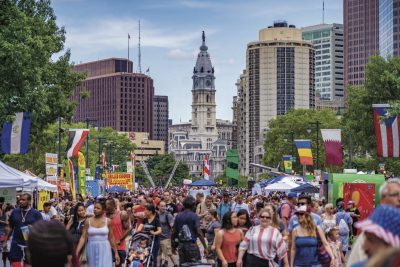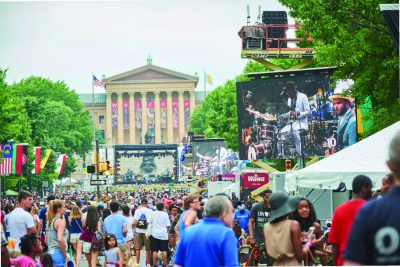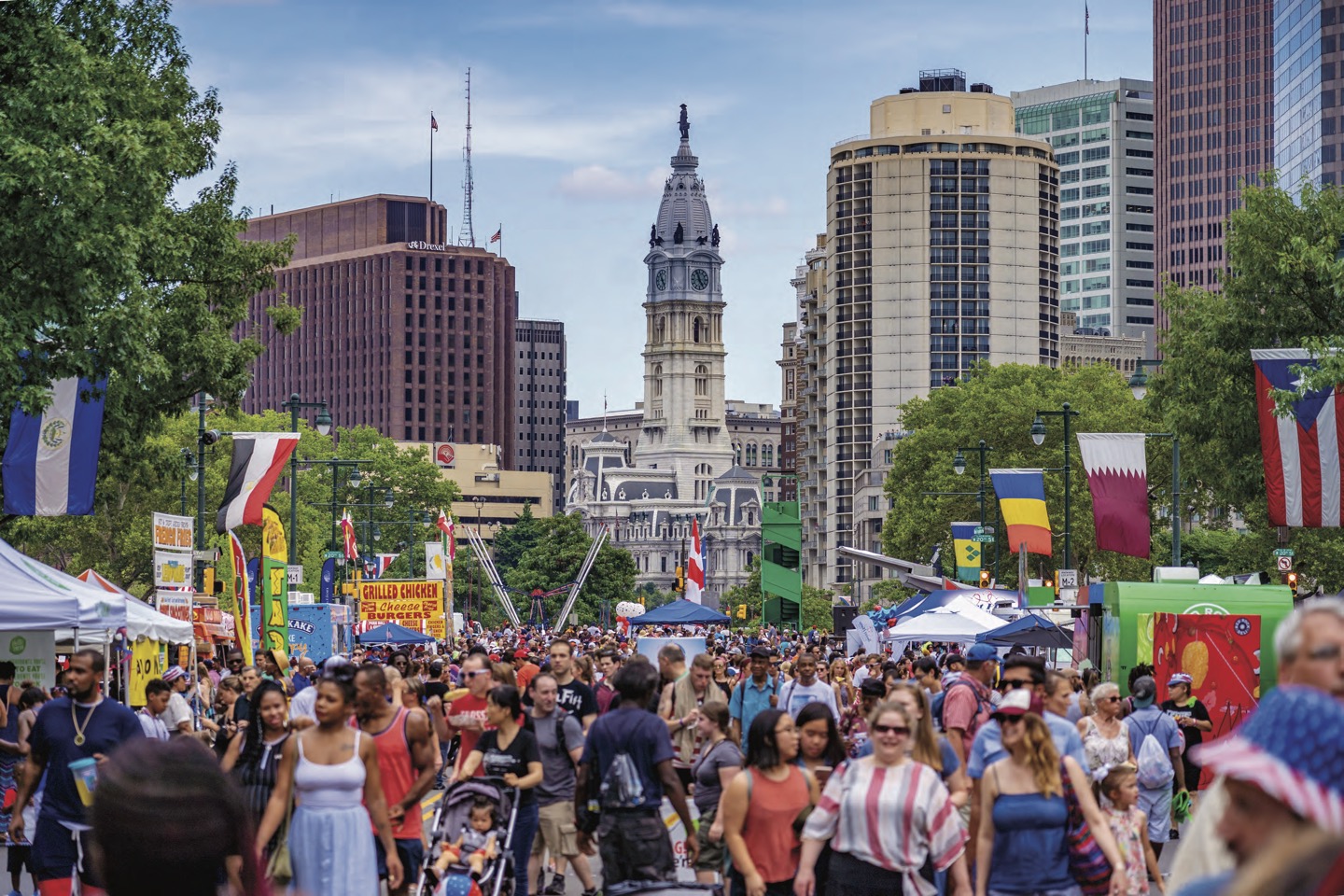Since the beginning of the pandemic, event planners have been looking into the future of large-scale events, as the safety of the public often lies in their hands for these in-person gatherings, which can last hours or even days. All too often, violence is overtaking some of the beloved and iconic events we as a culture hold dear—as with the July 4 shooting on Philadelphia’s Wawa Welcome America on the Benjamin Franklin Parkway, a Chicago parade and others that same day. These impact us as individuals psychologically, but also economically, including in terms of travel, tourism and hospitality.
In the wake of these tragic events, we can and must rely on professionals who specialize in this aspect of public safety. Several of these veteran event planners teach within the Event and Entertainment Management program at Temple University’s School of Sport, Tourism and Hospitality Management (STHM), which is welcoming its first full incoming class of freshmen this fall.
Expert planners like Assistant Professor Christine Cleaver have spent decades learning to pivot in real time as the public’s needs change—now more than ever and often more than we realize. Cleaver, who directs the Bachelor of Event and Entertainment Management program, has taught event operations and management for the past seven years. This industry pro was quoted in a Philadelphia Inquirer article about the shooting on the Ben Franklin Parkway—and the questions it raises about related safety measures. We wanted to hear more from her perspective based on her decades of experience—which includes her current role planning this fall’s inauguration activities at Temple University for President Dr. Jason Wingard.

STHM: From your perspective as an events professional, what impact do tragic events like what took place at Wawa Welcome America have for us—not just as citizens but as event consumers and as a culture that enjoys collective experiences?
Prof. Cleaver: Well, since COVID, there has been the need for different plans. Our industry has been in the process of devising new ways for the public to consume event experiences, whether in person, watching it live or a recording after the fact. And each one has its own safety needs. Even post pandemic, people are simply not just going to say, “I don’t want to go anywhere anymore.” So organizers adjust to new conditions. That could include the development of specific, active-shooter protocols. It’s not the happiest thing, but it could give comfort to your attendees to feel confident that, “Oh, they’ve thought about that.”
If you were following the story as it happened on the night of the 4th, you saw how there were NBC 10 reporters sheltering in place. It’s a perfect demonstration of why there must be standard operating procedures in every operations plan—just as there is a need for personal risk assessment, for a pilot or a soldier, on an individual basis.
What are the ramifications of a huge industry player like LiveNation announcement earlier this month they’re canceling a large, annual urban festival for safety reasons?
This is the first time a major event company has made this decision in reaction to gun control legislation. LiveNation decided that Georgia’s recent decision to pass a concealed carry law directly compromises their ability to protect their customers—because it means LiveNation can’t ban guns on public property. This has huge ramifications for event planning everywhere and for other festivals going forward, in terms of the planning itself as well as selecting venues—what states are more desirable in terms of minimizing safety risks. And as an article in Billboard magazine pointed out, this has a trickle-down effect in terms of local economies as well.

You worked as a planner on the city’s annual July 4 celebration for 15 years, among many other major events. What were some of the biggest lessons you and your fellow professionals had to learn the hard way?
The Harvest Festival in Las Vegas—site of the 2017 shooting that killed 60 people and wounded hundreds—changed large-scale event planning forever, in terms of security and mandatory metal detectors. Since the shooter was above the crowd, we can no longer plan events that consider only the ground level. Even if you comb every roof, you’re still dealing with individuals who are savvy about ways to get in and out. The truth is that, with outdoor events, you can never entirely eliminate the risk. So we now need to introduce elements such as a code for an active shooter—just as at a hospital there is a code blue for a hospital emergency. With the July 4 event, fortunately no crowd members were hurt and the two police officers who were wounded are recovering.
Security at indoor events seems more straightforward. For large outdoor events at a site like the Ben Franklin Parkway, are people as inclined to think ahead or at least respect the policies of event organizers?
We’re definitely in the era of “If you see something, say something.” Agility is key. But even an awareness on the part of event consumers is not sufficient. As I mentioned in the Inquirer article, on-the-ground event planners now need to function more like flight attendants, asking event-goers to look for exits wherever they are in a crowd. This applies even for outdoor events, given that the police have to block off streets to pedestrians as a safety measure—fundamental to a high-density urban event like Wawa Welcome America.
What are some concerns that are specific to the kind of event, whether it features a single stage, a festival, or an athletic event?
It’s our job to think through every inch of a space—how a stage is set up, adjacent buildings and the precise location of steps and other features for each property. I know the Welcome America setting well after working on it for so many years. That’s what you need: industry veterans who know the space or can come in and evaluate it from the inside out.
What’s one of the most extreme crisis safety planning situations you’ve faced as a professional?
It’s all about thinking way outside the box and planning for any eventuality. Back in 1999, I was planning a series of 24 events in 24 hours around New Year’s Eve, right when everyone was worried about the ramifications of Y2K. I got a call just days before requesting a safety plan for all 24 of those events—given that we did not know what the implications of a crisis at midnight would be and they were potentially so far-reaching. To give just one example, we provided the vehicles we used for transport with stockpiles of temporary stop signs. That way, in case all traffic lights stopped working—as some feared they would—drivers would be equipped to handle some highly dangerous intersections. It’s about planning for any and every eventuality and the logistical issues to address in advance for every instance.
The topic of safety and security is clearly already becoming a growing concern for potential internship partners and employers looking to hire STHM graduates. Which of your classes focus on these issues?
Our faculty address these issues in most of the classes that count toward the BSEEM major, from “Contemporary Issues in Tourism, Hospitality and Event Management,” “Event and Entertainment Operations” and “The Event Experience.” By the time they graduate, all of our BSEEM students will have had many conversations and have done projects that require this kind of thinking and planning. Students use news sources to identify, address and find ways they could resolve a range of issues, with security certainly being a key one. The operations course we work through the complexities of planning an event, every detail from concept, project management and pre-production through to onsite logistics, risk management, sustainability and measurability. Students put this learning into action in the Event Experience course, where they develop, plan and execute an official STHM school event.
What are some of the unique qualifications your students have in terms of event safety that set them apart in the workplace?
Another real-life application is our “Theater Safety and Management” course, where students learn the nuance for workplace safety and health for the theater industry. Having undergone a 30-hour training on federal and state OSHA guidelines, they earn General Industry Safety and Health Training Card from OSHA. That’s a huge asset going out into the job market—and ensures our next generation of professionals are at the very top of their game.
